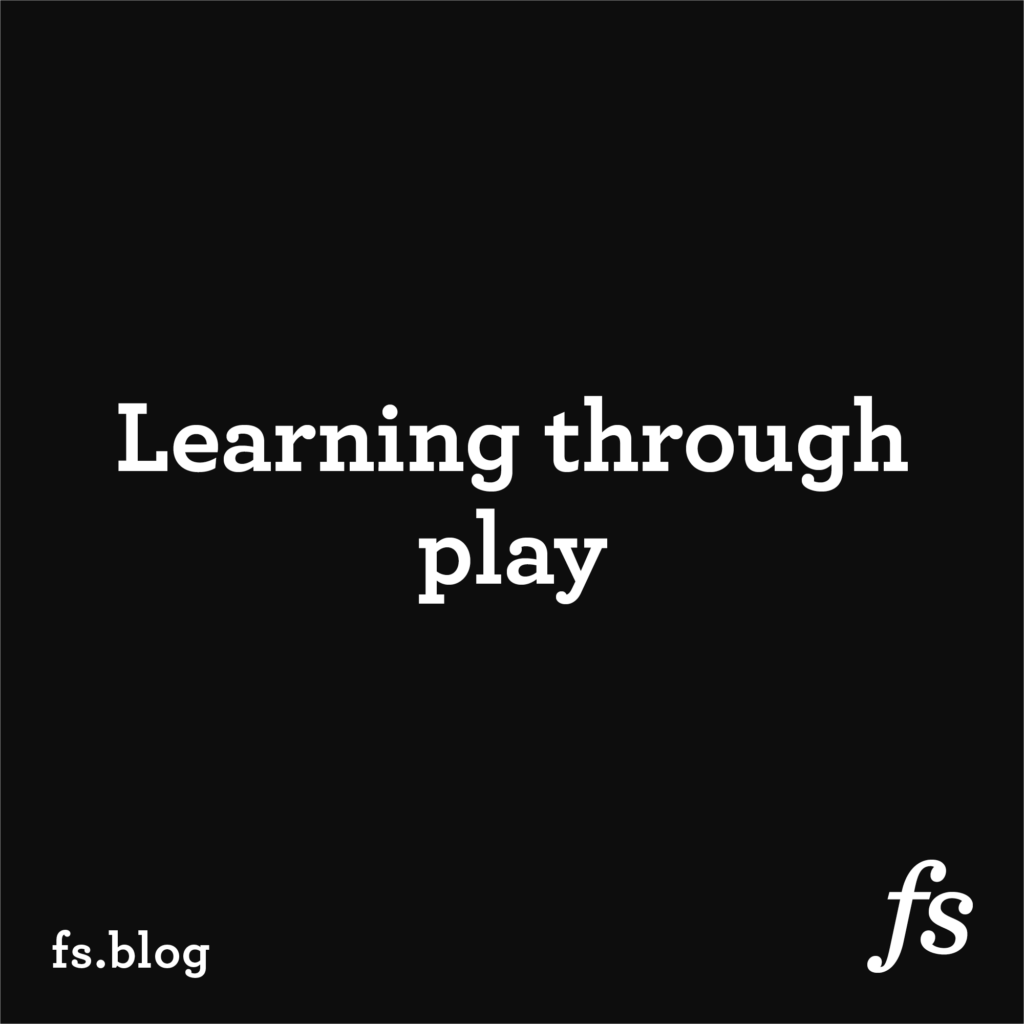Learning Through Play
Blog: FS - Smart decisions
Play is an essential way of learning about the world. Doing things we enjoy without a goal in mind leads us to find new information, better understand our own capabilities, and find unexpected beauty around us. Arithmetic is one example of an area we can explore through play.
Every parent knows that children need space for unstructured play that helps them develop their creativity and problem-solving skills. Free-form experimentation leads to the rapid acquisition of information about the world. When children play together, they expand their social skills and strengthen the ability to regulate their emotions. Young animals, such as elephants, dogs, ravens, and crocodiles, also develop survival skills through play.
The benefits of play don’t disappear as soon as you become an adult. Even if we engage our curiosity in different ways as we grow up, a lot of learning and exploration still comes from analogous activities: things we do for the sheer fun of it.
When the pressure mounts to be productive every minute of the day, we have much to gain from doing all we can to carve out time to play. Take away prescriptions and obligations, and we gravitate towards whatever interests us the most. Just like children and baby elephants, we can learn important lessons through play. It can also give us a new perspective on topics we take for granted—such as the way we represent numbers.
***
Playing with symbols
The book Arithmetic, in addition to being a clear and engaging history of the subject, is a demonstration of how insights and understanding can be combined with enjoyment and fun. The best place to start the book is at the afterword, where author and mathematics professor Paul Lockhart writes, “I especially hope that I have managed to get across the idea of viewing your mind as a playground—a place to create beautiful things for your own pleasure and amusement and to marvel at what you’ve made and at what you have yet to understand.”
Arithmetic, the branch of math dealing with the manipulation and properties of numbers, can be very playful. After all, there are many ways to add and multiply numbers that in themselves can be represented in various ways. When we see six cows in a field, we represent that amount with the symbol 6. The Romans used VI. And there are many other ways that unfortunately can’t be typed on a standard English keyboard. If two more cows wander into the field, the usual method of counting them is to add 2 to 6 and conclude there are now 8 cows. But we could just as easily add 2 + 3 + 3. Or turn everything into fractions with a base of 2 and go from there.
One of the most intriguing parts of the book is when Lockhart encourages us to step away from how we commonly label numbers so we can have fun experimenting with them. He says, “The problem with familiarity is not so much that it breeds contempt, but that it breeds loss of perspective.” So we don’t get too hung up on our symbols such as 4 and 5, Lockhart shows us how any symbols can be used to complete some of the main arithmetic tasks such as comparing and grouping. He shows how completely random symbols can represent amounts and gives insight into how they can be manipulated.
When we start to play with the representations, we connect to the underlying reasoning behind what we are doing. We could be counting for the purposes of comparison, and we could also be interested in learning the patterns produced by our actions. Lockhart explains that “every number can be represented in a variety of ways, and we want to choose a form that is as useful and convenient as possible.” We can thus choose our representations of numbers based on curiosity versus what is conventional. It’s easy to extrapolate this thinking to broader life situations. How often do we assume certain parameters are fixed just because that is what has always been done? What else could we accomplish if we let go of convention and focused instead on function?
***
Stepping away from requirements
We all use the Hindu-Arabic number system, which utilizes groups of tens. Ten singles are ten, ten tens are a hundred, and so on. It has a consistent logic to it, and it is a pervasive way of grouping numbers as they increase. But Lockhart explains that grouping numbers by ten is as arbitrary as the symbols we use to represent numbers. He explains how a society might group by fours or sevens. One of the most interesting ideas though, comes when he’s explaining the groupings:
“You might think there is no question about it; we chose four as our grouping size, so that’s that. Of course we will group our groups into fours—as opposed to what? Grouping things into fours and then grouping our groups into sixes? That would be insane! But it happens all the time. Inches are grouped into twelves to make feet, and then three feet make a yard. And the old British monetary system had twelve pence to the shilling and twenty shillings to the pound.”
By reminding us of the options available in such a simple, everyday activity as counting, Lockhart opens a mental door. What other ways might we go about our tasks and solve our problems? It’s a reminder that most of our so-called requirements are ones that we impose on ourselves.
If we think back to being children, we often played with things in ways that were different from what they were intended for. Pots became drums and tape strung around the house became lasers. A byproduct of this type of play is usually learning—we learn what things are normally used for by playing with them. But that’s not the intention behind a child’s play. The fun comes first, and thus they don’t restrain themselves to convention.
***
Have fun with the unfamiliar
There are advantages and disadvantages to all counting systems. For Lockhart, the only way to discover what those are is to play around with them. And it is in the playing that we may learn more than arithmetic. For example, he says: “In fact, getting stuck (say on 7 +8 for instance) is one of the best things that can happen to you because it gives you an opportunity to reinvent and to appreciate exactly what it is that you are doing.” In the case of adding two numbers, we “are rearranging numerical information for comparison purposes.”
The larger point is that getting stuck on anything can be incredibly useful. If forces you to stop and consider what it is you are really trying to achieve. Getting stuck can help you identify the first principles in your situation. In getting unstuck, we learn lessons that resonate and help us to grow.
Lockhart says of arithmetic that we need to “not let our familiarity with a particular system blind us to its arbitrariness.” We don’t have to use the symbol 2 to represent how many cows there are in a field, just as we don’t have to group sixty minutes into one hour. We may find those representations useful, but we also may not. There are some people in the world with so much money that the numbers that represent their wealth are almost nonsensical, and most people find the clock manipulation that is the annual flip to daylight savings time to be annoying and stressful.
Playing around with arithmetic can teach the broader lesson that we don’t have to keep using systems that no longer serve us well. Yet how many of us have a hard time letting go of the ineffective simply because it’s familiar?
Which brings us back to play. Play is often the exploration of the unfamiliar. After all, if you knew what the result would be, it likely wouldn’t be considered play. When we play we take chances, we experiment, and we try new combinations just to see what happens. We do all of this in the pursuit of fun because it is the novelty that brings us pleasure and makes play rewarding.
Lockhart makes a similar point about arithmetic:
“The point of studying arithmetic and its philosophy is not merely to get good at it but also to gain a larger perspective and to expand our worldview . . . Plus, it’s fun. Anyway, as connoisseurs of arithmetic, we should always be questioning and critiquing, examining and playing.”
***
We suggest that playing need not be confined to arithmetic. If you happen to enjoy playing with numbers, then go for it. Lockhart’s book gives great inspiration on how to have fun with numbers. Playing is inherently valuable and doesn’t need to be productive. Children and animals have no purpose for play; they merely do what’s fun. It just so happens that unstructured, undirected play often has incredibly powerful byproducts.
Play can lead to new ideas and innovations. It can also lead to personal growth and development, not to mention a better understanding of the world. And, by its definition, play leads to fun. Which is the best part. Arithmetic is just one example of an unexpected area we can approach with the spirit of play.
The post Learning Through Play appeared first on Farnam Street.
Leave a Comment
You must be logged in to post a comment.








